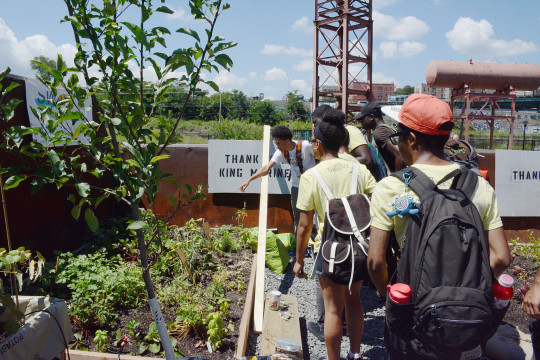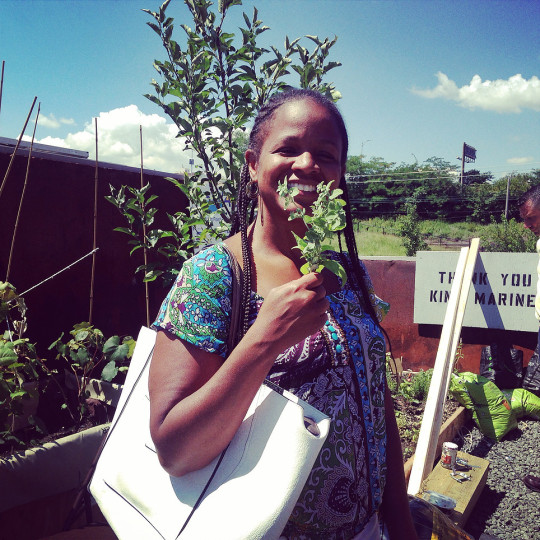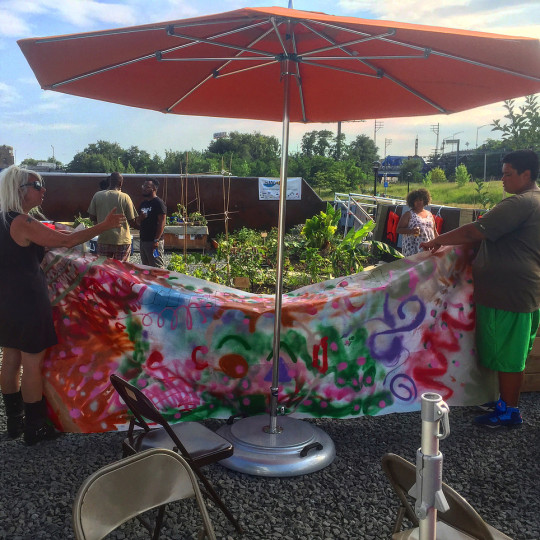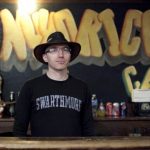Fellows at 30 / Fiscal Sponsorship: An Interview with Mary Mattingly
“Swale is an artwork but it’s also part of a movement-building process. It is largely made up of people I have met with similar passions working towards similar goals."
Visual artist Mary Mattingly creates sculptural ecosystems in urban spaces. Her latest work Swale is a floating food forest traveling NYC’s waterways. You might have seen the barge earlier this summer, docked at Concrete Plant Park in the Bronx or at Governor’s Island. Swale asks, “what if healthy, fresh food could be a free public service and not just an expensive commodity?” This NYFA fiscally sponsored project is dedicated to rethinking and challenging New York City’s connection to the environment, reinforcing water as a commons and working towards fresh food as a commons too. Swale is currently parked at Brooklyn Bridge Park, Pier 6.
Mary Mattingly is also a NYFA Fellow in Sculpture ‘11 and has led projects such as the Waterpod Project, Flock House Project, Triple Island, Pull, and WetLand. Her work has been exhibited at the Museo Nacional de la Bellas Artes de la Habana, the International Center of Photography, the Seoul Art Center, the Brooklyn Museum, the New York Public Library, deCordova Museum and Sculpture Park, and the Palais de Tokyo.
Visit Swale and stay up to date with their calendar of events!
Where: Docked in Brooklyn Bridge Park, Pier 6, Brooklyn New York
When: Swale Open House: 11:00 AM – 6:00 PM Thursdays, Fridays, Saturdays, and Sundays, through November 13, 2016

NYFA: Why is growing public food in public spaces in New York City illegal? How does the garden aboard Swale differ from community gardens that also grow food?
Mary Mattingly: In New York City picking plants in public spaces is illegal and considered destruction of property. This law was created in order to protect public lands from being over-foraged. Through a partnership with the Urban Field Station, I worked with the NYC Department of Parks on Swale and have learned that the law has also been enforced due to more recent turns in New York City’s park maintenance. For 10+ years, many city parks utilize chemicals like Monsanto’s Roundup in place of less harmful maintenance methods, and in response to budget cuts. Currently, reasons to enforce this law have just as much to do with varying levels of chemical contaminants in parks as with questions about education. The city doesn’t want to be liable for someone eating the wrong thing.
All of these issues need to be addressed if Swale is to become more than a proposal, and if public greenways could be transformed to public food-ways in New York City. I believe that the benefits far outweigh the risks and that these risks can be mitigated with signs. As a public food forest, Swale can only exist in New York because it is on the waterways. The waterways are the closest space we have in New York to a true commons.

NYFA: How did you build the amazing network of artists, engineers, designers, and horticulture experts who created Swale? How does this collaboration become part of the process?
MM: Swale is an artwork but it’s also part of a movement-building process. It is largely made up of people I have met with similar passions working towards similar goals. Everyone brings different skills and interests to the project and therefore it takes on a diverse set of goals. Often these are people who work towards equal distribution of wellness across this city and beyond. People email our website to ask about programming, and we also reach out to people to align their work with ours.
NYFA: Have you found a permanent home for Swale?
MM: With our partner organizations including Youth Ministries for Peace and Justice, the Bronx River Alliance, Partnership for Parks, Rocking the Boat, and The Point, we would like Swale to find a permanent home in the Bronx. To do this, we are working towards a long-term maintenance plan with the NYC Department of Parks. Simultaneously we are working on public land in New York City where the edible perennial plants on Swale can be transplanted and accessible to anyone.
NYFA: What role does social practice play in your broader practice? Do you ever feel the urge to make art alone?
MM: Yes, I spend time writing alone, but am also continually sketching and making sculptures or photographs. It’s important for one part of my art-life to respond to and learn from the other, and I undulate between the two. My studio work influences public work and they both affect and determine how I live.

NYFA: Can you please discuss your Manifesto and how this document frames your studio practice?
MM: It took my struggle with a violent person to write this manifesto, and to realize that we have bigger battles to fight than those we may want to fight against each other. I was trying to translate that pain into something meaningful. But it resonates with me on a more macro level, based on an economic violence that encompasses political, environmental and social devastation, where literally everything and everyone is a commodity.
It has become my set of rules for living and making artwork. It’s network-building and communal in the sense that it is a call to like-minded people to build new micro-utopian worlds that are regenerative.
NYFA: Why did you choose to apply to NYFA Fiscal Sponsorship and how has fiscal sponsorship influenced your fundraising strategy?
MM: NYFA’s fiscal sponsorship program is very important for the project. In the short term it has made it possible to accept ongoing monetary donations for Swale, but in the long term, it offers Swale stability and planning towards a longstanding business plan.
Check out their active Facebook page or website for updates about events and exhibitions aboard Swale.
Interested in NYFA fiscal sponsorship for your latest creative idea? We have free quarterly application deadlines, click here to learn more!
– Interview conducted by Madeline Scholl, former Program Associate Alumni Relations & Madeleine Cutrona, Program Assistant Fiscal Sponsorship & Finance
Images courtesy of Swale: Swale in Governor’s Island; Brandon of Youth Ministries for Peace and Justice tours a group; Picking Vegetables and Herbs, Kim Reed Kuhn Working with Chandler





